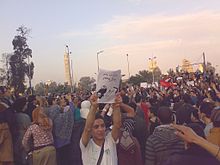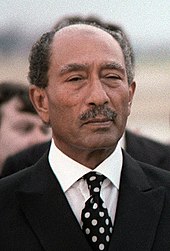History of the Republic of Egypt
Nasser's tenure
After the overthrow of the monarchy (July 23, 1952) by a military coup under Muhammad Nagib and Gamal Abdel Nasser , the republic was proclaimed a year later (June 18, 1953) . General Nagib was overthrown by Nasser in 1954. Until 1970 Nasser determined the politics of Egypt as president . The government became socialist and a one-party state was built under the Arab Socialist Union (ASU) . The planned land reform and the fight against poverty did not lead to the hoped-for successes. In order to finance the construction of the Aswan Dam , the Suez Canal was nationalized in 1956, which led to the Suez Crisis in October 1956 when Great Britain , France and Israel attacked Egypt and occupied the Suez Canal zone and the Sinai . Under pressure from the great powers USA and Soviet Union , the interveners had to withdraw again. Thus Nasser was able to convert the military defeat into a political victory. However, further nationalization programs in the economy led to the end of foreign investment in Egypt. In 1956 women were given the right to vote and stand as a candidate . Voting was compulsory for men, not for women. Men who had the right to vote were automatically registered, women had to file a special application in order to exercise their political rights, and even in 1972 only 12 percent of women were registered. It was not until 1979 that this disadvantage for women was abolished.

Due to a lack of domestic political success, Nasser turned increasingly to foreign policy. Thus Egypt became a leading member of the movement of the non-aligned states and supported the anti-colonial liberation struggle and others. a. in Algeria and Yemen . He also propagated pan-Arabism . Nasser's greatest success in this regard was the United Arab Republic with Syria (1958), which only existed until 1961, and the merger of this United Arab Republic with North Yemen to form the United Arab States . But this led to the opposition of the conservative monarchies on the Arabian Peninsula , especially in Jordan and Iraq , which united in the Arab Federation . A reunification with Syria and Iraq to form the United Arab Republic in 1963 failed because of differences between the Iraqi and Syrian wings of the Baath Party . Even if a de facto union with the republican North Yemen (1962–1967) still took place, Nasser's pan-Arabism had failed.
The defeat of Egypt in the Six Day War (1967) and the occupation of Sinai by Israel led to an even closer relationship with the Soviet Union. On April 11, 1971, as part of the War of Attrition , Egypt received modern MiG-23 fighter aircraft from the Soviet Union. Israel saw their stationing endanger the balance in the Middle East.
Sadat's tenure
Under Sadat , however, there was a break with the Soviet Union and rapprochement with the USA in 1972/1976. Nevertheless, on March 1, 1977, the Soviet Union surprisingly delivered 50 MiG-21 fighter aircraft to Egypt. In the Yom Kippur War (October 6 to 24, 1973), the Egyptian troops were able to achieve great initial successes against Israel.
After Sadat's visit to Israel (November 19-21, 1977) and the Camp David Agreement (September 17, 1978), Sadat and Menachem Begin received the Nobel Peace Prize (1978). On March 26, 1979 in DC Washington, the peace with Israel closed, which led to the evacuation of the Sinai by the Israeli troops. However, this equalization led to the isolation of Egypt in the Islamic world. So the exclusion from the Arab League took place . In 1977 there was a four-day border war with neighboring Libya , which strongly condemned Egypt's rapprochement with Israel.
Mubarak's term of office
After Sadat was assassinated by Muslim extremists (October 6, 1981), Hosni Mubarak took over the government. Under him, groups like the Muslim Brotherhood were suppressed and Egypt's isolation in the Islamic world was broken again. In 1989, the country was again accepted into the Arab League.
On the question of Palestine , Egypt tried to mediate between Israel and the Palestinians . Otherwise it was an important partner of the USA and the European countries in the Middle East.
Terrorist activities attributed to the Muslim Brotherhood have increased since the early 1990s. Attempts on Mubarak in 1994 and 1996 failed. The terror was also directed against tourism , which is the most important industry in Egypt. After the attacks in Luxor and Cairo, in which several tourists were killed, tourism suffered significant slumps, which led to great economic difficulties. Initially, the Muslim Brotherhood was also held responsible for planning an attack on a Coptic church in Alexandria at the beginning of 2011 , but at the beginning of February 2011 proceedings were opened against the country's interior minister, Habib al-Adli , who resigned during the revolution in Egypt in 2011 . He is accused of planning this attack and then pushing it on to the Muslim Brotherhood.
The three-round elections to the People's Council between November 9th and December 7th 2005 made massive gains for the opposition. In total, the alliance received almost 100 of the 440 seats. The ruling National Democratic Party (NDP) won with 311 seats ( 2000 : 388). This was followed by the Muslim Brotherhood with 88 seats (17) and the liberal New Wafd Party with 6 (7) seats. 27 seats (30) were occupied by independents and members of smaller parties. 12 seats (2) are vacant. After the Muslim Brotherhood had already become stronger after the first round of voting, the last round was overshadowed by violent attempts by the security forces to prevent their supporters from entering the polling stations; 12 people were killed. The success of the Muslim Brotherhood was primarily due to their social commitment in the poor neighborhoods of Cairo, which the NDP tolerated.
The partial elections for the Shura Council in June / July 2007 also resulted in a majority for the NDP.

After the 2011 revolution
In the wake of the Arab Spring , protests broke out in Egypt , which contributed to Mubarak's resignation. The National Democratic Party was dissolved and Mubarak was sentenced to life imprisonment . In the first free parliamentary elections , the Salafist parties won a majority in parliament. The strongest party was the Freedom and Justice Party , which belongs to the Muslim Brotherhood. As a result, the Muslim Brother Mohammed Morsi became president. He held a constitutional referendum , which strengthened his power and had similarities with the Sharia .
Morsi's term of office was marked by demonstrations by the liberals and left, which were brutally suppressed. After the situation worsened, the military seized power on July 3, 2013. As a result, Adli Mansur , a former Mubarak official, was named president and Hasim al-Beblawi was named prime minister. However, supporters of Mohammed Morsi opposed the new government and called for protests. The demonstrations were bloodily suppressed and at least 43 people died. Former President Hosni Mubarak was released by the new government and has been under house arrest ever since . The trial of Mubarak and the Muslim Brotherhood began on August 25, 2013. At the end of September 2013, the Muslim Brotherhood was officially banned. In January 2014, a constitutional referendum was held, which protects human rights but also strengthens the role of the military . 98% of the electorate voted for the new constitution. General Abd al-Fattah as-Sisi was victorious in the presidential election in May 2014 .
See also
Individual evidence
- ↑ Caroline Daley, Melanie Nolan (Eds.): Suffrage and Beyond. International Feminist Perspectives. New York University Press New York 1994, p. 351.
- ↑ June Hannam, Mitzi Auchterlonie, Katherine Holden: International Encyclopedia of Women's Suffrage. ABC-Clio, Santa Barbara, Denver, Oxford 2000, ISBN 1-57607-064-6 , p. 94.
- ↑ - New Parline: the IPU's Open Data Platform (beta). In: data.ipu.org. Retrieved September 30, 2018 .
- ↑ Archived copy ( Memento from January 20, 2013 in the Internet Archive )
- ↑ Washington's incarnate in Cairo . In: Ossietzky . 4/2011; Horst Schäfer comments on the fall of Hosni Mubarak and the involvement of the US diplomat Frank Wisner on behalf of the Barack Obama's government . (last accessed on March 21, 2020)
- ^ New Egyptian government in March 2011. Retrieved March 23, 2011 .
- ^ Franziska Grillmeier: Egypt's head of state: Adli Mansur, a Mubarak official at the top. In: welt.de . July 4, 2013, accessed October 7, 2018 .
- ↑ sk: ElBaradei Vice President: Ex-Finance Minister al-Beblawi becomes the new head of government in Egypt. In: Focus Online . July 9, 2013, accessed October 14, 2018 .
- ↑ dpa / AP / AFP / mcz: Egypt: Several dead in the evacuation of protest camps in Cairo. In: welt.de . August 14, 2013, accessed October 7, 2018 .
- ↑ http://newsticker.sueddeutsche.de/list/id/1485957 ( Memento from December 2, 2013 in the Internet Archive )
- ^ «Trials against the two regimes». In: nzz.ch. August 25, 2013, accessed October 14, 2018 .
- ↑ ps / slc: Judgment in Cairo: Court in Egypt bans Muslim Brotherhood. In: Focus Online . September 23, 2013, accessed October 14, 2018 .
- ↑ http://www.handelsblatt.com/politik/international/nach-dem-sturz-mubaraks-aeggypt-stimmen-ueber-neue-verfassungs-ab/9328098.html
- ↑ http://english.ahram.org.eg/NewsContent/1/64/91874/Egypt/Politics-/UPDATE---approves-postJune--constitution.aspx
- ^ New President in Egypt at spiegel.de, May 29, 2014 (accessed on May 29, 2014).



